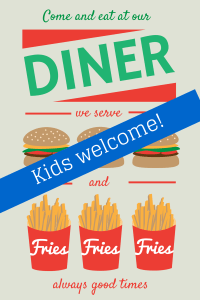Eating out offers a communication skill-building opportunity for kids.
Kids acting up in restaurants results in bad press from time to time, but don’t let that deter you. While it won’t necessarily be relaxing for you (that’s what date night is for, right?!), taking your children out to eat periodically is an enriching experience that helps them learn important communication skills and appropriate behavior in a public place.
- Choose a family-friendly restaurant and if you have younger kids, come prepared with crayons, scratch paper and a light snack. My husband and I always chose loud restaurants when our kids were little since they were still learning to keep their voices down-and if necessary, we wanted to have the option to clear out quickly with as little embarrassment as possible.
- If your child is an unpredictable toddler or preschooler, be mentally prepared to pack your meal to go and pick up the tab early should a tantrum ensue. You might warn the server. Trust me, you won’t be the first parent to have to leave before the meal is over! Sitting still in a restaurant isn’t the easiest activity for a busy, moody tot. (And hungry people are irritated people no matter what their age.)
- Engage your kids in small talk. Talk about the menu choices and the foods they like to eat or might like to try. Discuss the restaurant surroundings. Tell stories of your favorite foods when you were a child. Review the day or talk about what you are looking forward to the next day or over the weekend.
- Even preschoolers can learn to order a drink. Give them two choices like milk or juice. Tell them to look at the server when they order the drink and to speak up using “please” and “thank you”. If you have a shy child, be ready to provide back up and encouragement during the ordering process.
- Elementary age children should be able to order their main meal. Discuss the menu choices with your child and then coach him before the server arrives about making eye contact and speaking up while ordering. Provide support for any questions that might come up during the ordering process if it seems like your child needs help.
While you may not be able to eat out frequently with your family due to the cost, take advantage of the times you can make it work. Lunches are usually less expensive than dinners. Even if you choose a fast-food restaurant, your child can still help during the ordering process. Over time, your children will learn essential skills about how to behave in public and will grow more confident communicating politely on their behalf with others.

